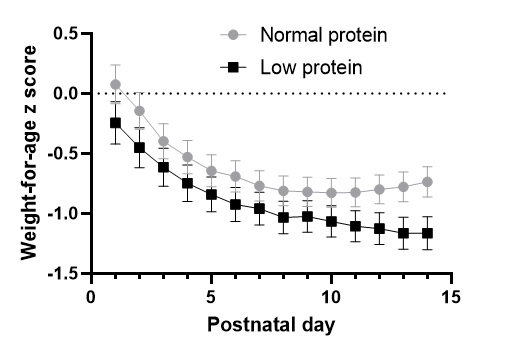Neonatal Fetal Nutrition & Metabolism
Category: Abstract Submission
Neonatal Fetal Nutrition & Metabolism IV
444 - Association between Total/Enteral Protein Intake and Fat-Free Mass Gains in Infants Born Very Preterm
Sunday, April 24, 2022
3:30 PM - 6:00 PM US MT
Poster Number: 444
Publication Number: 444.335
Publication Number: 444.335
Maggie Jerome, University of Alabama at Birmingham, Birminngham, AL, United States; Emily Gunawan, University of Alabama School of Medicine, Birmingham, AL, United States; Ariel Salas, UAB, Birmingham, AL, United States

Maggie Jerome, MS, RD
Graduate Student
University of Alabama at Birmingham
University of Alabama at Birmingham
Presenting Author(s)
Background: Identifying nutritional practices that promote fat-free mass (FFM) gains and prevent substantial declines in weight-for-age z scores could favor long-term neurodevelopmental and metabolic outcomes of infants born preterm. Few studies have examined the association between daily enteral protein intake and body composition outcomes.
Objective: To determine the association between daily protein provision during the first two weeks after birth and FFM at 36 weeks of postmenstrual age (PMA) or discharg.
Design/Methods: This was a prospective cohort study of 66 infants born preterm at 28-32 weeks of gestation in which parenteral and enteral nutrition data were collected daily during the first two weeks after birth and weekly after that until discharge. Daily enteral caloric intake in kcal/kg, enteral protein intake in g/kg, and enteral protein intake in g/100 kcal were calculated. The primary outcome of FFM was assessed with air displacement plethysmography prior to discharge or 36 weeks PMA (whichever occurred first). FFM z scores were used to define low FFM gain ( < 3rd percentile) and normal FFM gain ( >3rd percentile).
Results: The median gestational age of study participants was 30 weeks (IQR: 29 – 31). Mean birthweight was 1341 g ± 324. The median postnatal age in days at the time of FFM assessment was 39 days (IQR: 29 – 46). The mean FFM-for-age z score was -1.54 ± 1.11. Daily total protein intake was not significantly associated with normal FFM gain at discharge in an unadjusted repeated-measures mixed model (p=0.95) [Fig. 1, panel A]. Daily enteral protein intake in g/kg and g/100 kcal were associated with higher FFM z scores (p=0.05 and p=0.02, respectively) [Fig. 1, panel B &C]. The association between cumulative enteral protein intake > 22 g/kg at postnatal day 14 and daily changes in weight-for-age z scores during the first 2 weeks after birth did not reach statistical significance (p=0.06) [Fig. 2].Conclusion(s): In stable very preterm infants, nutritional interventions that increase enteral rather than total protein intake during the first 2 weeks after birth could improve FFM at 36 weeks PMA and minimize declines in weight-for-age z scores.
Maggie Jerome CVMaggie Jerome CV.pdf
Figure 2: The association between cumulative enteral protein intake > 22 g/kg at postnatal day 14 and daily changes in weight-for-age z scores during the first 2 weeks after birth
Objective: To determine the association between daily protein provision during the first two weeks after birth and FFM at 36 weeks of postmenstrual age (PMA) or discharg.
Design/Methods: This was a prospective cohort study of 66 infants born preterm at 28-32 weeks of gestation in which parenteral and enteral nutrition data were collected daily during the first two weeks after birth and weekly after that until discharge. Daily enteral caloric intake in kcal/kg, enteral protein intake in g/kg, and enteral protein intake in g/100 kcal were calculated. The primary outcome of FFM was assessed with air displacement plethysmography prior to discharge or 36 weeks PMA (whichever occurred first). FFM z scores were used to define low FFM gain ( < 3rd percentile) and normal FFM gain ( >3rd percentile).
Results: The median gestational age of study participants was 30 weeks (IQR: 29 – 31). Mean birthweight was 1341 g ± 324. The median postnatal age in days at the time of FFM assessment was 39 days (IQR: 29 – 46). The mean FFM-for-age z score was -1.54 ± 1.11. Daily total protein intake was not significantly associated with normal FFM gain at discharge in an unadjusted repeated-measures mixed model (p=0.95) [Fig. 1, panel A]. Daily enteral protein intake in g/kg and g/100 kcal were associated with higher FFM z scores (p=0.05 and p=0.02, respectively) [Fig. 1, panel B &C]. The association between cumulative enteral protein intake > 22 g/kg at postnatal day 14 and daily changes in weight-for-age z scores during the first 2 weeks after birth did not reach statistical significance (p=0.06) [Fig. 2].Conclusion(s): In stable very preterm infants, nutritional interventions that increase enteral rather than total protein intake during the first 2 weeks after birth could improve FFM at 36 weeks PMA and minimize declines in weight-for-age z scores.
Maggie Jerome CVMaggie Jerome CV.pdf
Figure 2: The association between cumulative enteral protein intake > 22 g/kg at postnatal day 14 and daily changes in weight-for-age z scores during the first 2 weeks after birth

